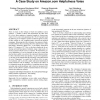Free Online Productivity Tools
i2Speak
i2Symbol
i2OCR
iTex2Img
iWeb2Print
iWeb2Shot
i2Type
iPdf2Split
iPdf2Merge
i2Bopomofo
i2Arabic
i2Style
i2Image
i2PDF
iLatex2Rtf
Sci2ools
109
click to vote
WWW
2009
ACM
2009
ACM
How opinions are received by online communities: a case study on amazon.com helpfulness votes
There are many on-line settings in which users publicly express opinions. A number of these offer mechanisms for other users to evaluate these opinions; a canonical example is Amazon.com, where reviews come with annotations like "26 of 32 people found the following review helpful." Opinion evaluation appears in many off-line settings as well, including market research and political campaigns. Reasoning about the evaluation of an opinion is fundamentally different from reasoning about the opinion itself: rather than asking, "What did Y think of X?", we are asking, "What did Z think of Y's opinion of X?" Here we develop a framework for analyzing and modeling opinion evaluation, using a large-scale collection of Amazon book reviews as a dataset. We find that the perceived helpfulness of a review depends not just on its content but also but also in subtle ways on how the expressed evaluation relates to other evaluations of the same product. As part of ou...
Internet Technology | Mining General Terms | Natural Mathematical Model | Opinion Evaluation | WWW 2009 |
| Added | 21 Nov 2009 |
| Updated | 21 Nov 2009 |
| Type | Conference |
| Year | 2009 |
| Where | WWW |
| Authors | Cristian Danescu-Niculescu-Mizil, Gueorgi Kossinets, Jon M. Kleinberg, Lillian Lee |
Comments (0)

